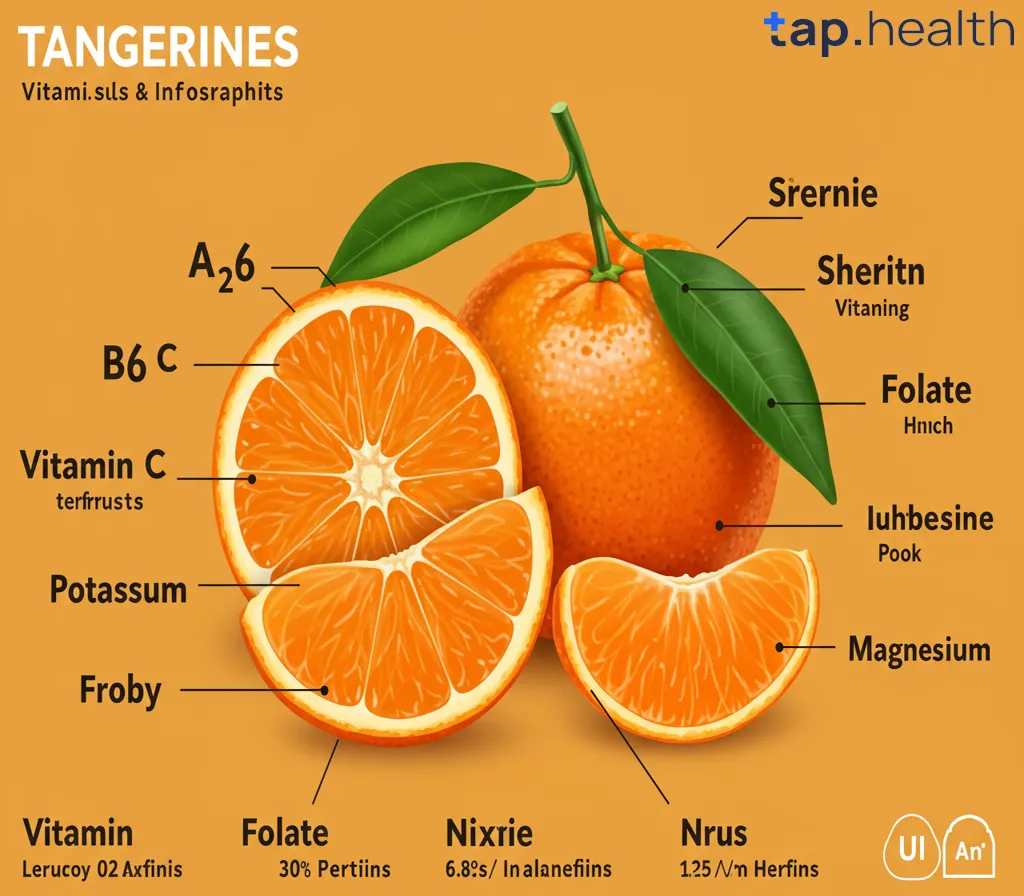Tangerines are not just delicious and juicy fruits—they are also packed with essential vitamins and nutrients that can contribute to your overall health and well-being. These small citrus fruits, known for their bright orange skin and sweet, tangy flavor, are a powerhouse of nutrients that can support your immune system, skin, and overall wellness.
In this blog post, we will dive deep into the vitamins that tangerines offer, explaining how each one benefits your body. We will also discuss the importance of incorporating tangerines into your diet and how to maximize their nutritional value. Whether you’re looking to boost your immune system, improve skin health, or just enjoy a tasty snack, tangerines are an excellent choice. Let’s explore the many benefits of this popular fruit!
What Are Tangerines?
Before we get into the details of the vitamins in tangerines, let’s take a moment to understand what these fruits are.
Tangerines are a variety of mandarin oranges, known for their small size, easy-to-peel skin, and sweet, tangy flavor. They belong to the citrus family, which includes oranges, lemons, and grapefruits. The tangerine tree is believed to have originated in Southeast Asia, but it is now grown in various regions worldwide.
These fruits are typically available in the winter months and are often seen as a healthy, refreshing snack during the holiday season. In addition to being a convenient snack, tangerines are also used in salads, smoothies, and even desserts.
What Vitamins Does Tangerine Have?
Now, let’s explore the vitamins that make tangerines so nutritious and beneficial for your health.
1. Vitamin C: The Immune System Powerhouse
One of the most well-known benefits of tangerines is their high vitamin C content. Vitamin C is essential for various bodily functions, including immune system support, skin health, and wound healing.
How Vitamin C Benefits Your Health
- Boosts Immunity: Vitamin C is a powerful antioxidant that helps protect your body against infections. It supports the immune system by enhancing the production of white blood cells, which are responsible for fighting off harmful bacteria and viruses.
- Promotes Healthy Skin: Vitamin C is vital for the production of collagen, a protein that helps keep your skin firm and elastic. Consuming enough vitamin C can help reduce wrinkles, promote skin repair, and protect your skin from damage caused by UV rays.
- Fights Free Radicals: As an antioxidant, vitamin C helps neutralize free radicals—unstable molecules that can damage cells and contribute to aging and chronic diseases.
- Improves Iron Absorption: Vitamin C enhances the absorption of non-heme iron (the kind found in plant-based foods), making it essential for those on vegetarian or vegan diets.
How Much Vitamin C Does Tangerine Contain?
A single medium-sized tangerine (about 100 grams) contains approximately 26.7 mg of vitamin C, which is about 30% of the recommended daily intake for an adult. This makes tangerines an excellent source of vitamin C, especially considering that they are delicious and easy to incorporate into your diet.
Best Ways to Enjoy Vitamin C from Tangerines
Tangerines are a great snack on their own, but you can also add them to salads, smoothies, or fruit bowls for a burst of vitamin C. Their natural sweetness makes them a great addition to both savory and sweet dishes.
Benefits of Vitamin C in Tangerines:
- Strengthens the immune system.
- Helps maintain youthful, healthy skin.
- Enhances the absorption of iron.
- Reduces the risk of chronic diseases by fighting oxidative stress.
2. Vitamin A: Supporting Vision and Skin Health
Vitamin A is another essential nutrient found in tangerines. While vitamin A is often associated with carrots and other orange vegetables, tangerines also provide a healthy dose of this important vitamin.
How Vitamin A Benefits Your Health
- Promotes Healthy Vision: Vitamin A is crucial for maintaining good vision, especially in low-light conditions. It plays a key role in the production of rhodopsin, a pigment in the retina that helps you see in dim light.
- Supports Skin Health: Vitamin A is essential for maintaining healthy skin. It helps regulate the production of skin cells, prevents dryness, and can help reduce the appearance of wrinkles and fine lines.
- Enhances Immune Function: Like vitamin C, vitamin A is essential for a strong immune system. It helps maintain the integrity of the skin and mucous membranes, which act as barriers against infections.
How Much Vitamin A Does Tangerine Contain?
Tangerines contain a small but beneficial amount of vitamin A, particularly in the form of beta-carotene, a precursor to vitamin A. A medium tangerine contains about 28 IU of vitamin A, which may seem modest, but it still contributes to your daily vitamin A needs when combined with other sources of the nutrient.
Benefits of Vitamin A in Tangerines:
- Improves vision and eye health.
- Supports the health and appearance of your skin.
- Boosts immune function to help fight infections.
3. Folate (Vitamin B9): Essential for Cell Growth and Reproduction
Folate, also known as vitamin B9, is another important vitamin found in tangerines. Folate plays a key role in the body’s ability to produce and maintain new cells, making it essential for overall health.
How Folate Benefits Your Health
- Supports Cell Division: Folate is essential for DNA synthesis and cell division. This makes it especially important during periods of rapid growth, such as pregnancy, infancy, and adolescence.
- Prevents Neural Tube Defects: Adequate folate intake during pregnancy is crucial for preventing neural tube defects in the developing fetus, such as spina bifida.
- Reduces Risk of Birth Defects: Folate is also linked to a reduced risk of birth defects and complications during pregnancy.
- Supports Heart Health: Folate helps lower homocysteine levels in the blood, a substance that, at high levels, may increase the risk of heart disease.
How Much Folate Does Tangerine Contain?
A medium-sized tangerine contains about 18 mcg of folate, which accounts for about 5% of the recommended daily intake for adults. While this is not a large amount, consuming tangerines along with other folate-rich foods can help meet your daily needs.
Benefits of Folate in Tangerines:
- Essential for cell growth and development.
- Prevents birth defects during pregnancy.
- Supports healthy heart function by reducing homocysteine levels.
4. Vitamin B6: Helping Your Body Function Properly
Vitamin B6, also known as pyridoxine, is another important vitamin found in tangerines. Vitamin B6 plays a key role in many bodily functions, including metabolism, brain health, and immune system support.
How Vitamin B6 Benefits Your Health
- Supports Brain Function: Vitamin B6 is involved in the production of neurotransmitters, chemicals that transmit signals in the brain. This helps regulate mood and cognitive function, and it may reduce the risk of mental health conditions like depression.
- Boosts Metabolism: Vitamin B6 plays a role in the metabolism of proteins, fats, and carbohydrates, helping the body convert food into energy.
- Promotes Immune Health: Vitamin B6 supports the production of white blood cells, which are essential for defending against infections.
- Helps with Red Blood Cell Production: Vitamin B6 is necessary for the production of hemoglobin, which helps carry oxygen in the blood.
How Much Vitamin B6 Does Tangerine Contain?
A medium tangerine contains about 0.05 mg of vitamin B6, which is about 4% of the recommended daily intake for an adult. While this is a modest amount, tangerines can still contribute to your daily B6 needs when eaten in combination with other sources of the vitamin.
Benefits of Vitamin B6 in Tangerines:
- Supports brain health and mood regulation.
- Helps with energy production by boosting metabolism.
- Strengthens the immune system.
5. Other Important Nutrients in Tangerines
In addition to the vitamins mentioned above, tangerines also provide several other important nutrients, including:
- Fiber: Tangerines are a good source of dietary fiber, which is important for digestive health and can help regulate blood sugar levels. Fiber also helps you feel fuller for longer, which can aid in weight management.
- Potassium: Potassium helps regulate fluid balance, maintain healthy blood pressure, and support muscle function.
- Magnesium: Magnesium is important for bone health, muscle function, and energy production.
These nutrients, along with the vitamins found in tangerines, contribute to a well-rounded diet and overall health.
FAQ on What Vitamins Does Tangerine Have?
1. What vitamins are in tangerines?
Tangerines are rich in vitamin C, which is known for boosting immunity and supporting skin health. They also contain vitamin A (in the form of beta-carotene), folate (vitamin B9), vitamin B6, and smaller amounts of vitamin E.
2. Are tangerines good for your immune system?
Yes, tangerines are excellent for your immune system due to their high vitamin C content. Vitamin C helps strengthen the immune system, allowing your body to fight off infections more effectively.
3. How much vitamin C is in a tangerine?
A medium-sized tangerine contains about 26.7 mg of vitamin C, which is approximately 30% of the daily recommended intake for adults.
4. Can tangerines help with skin health?
Yes, tangerines are beneficial for skin health due to their vitamin C content, which supports collagen production, helps repair skin tissue, and protects the skin from UV damage.
5. How should I eat tangerines to get the most vitamins?
Eating tangerines raw is the best way to retain all their vitamins. You can also add them to salads, smoothies, or fruit bowls for a refreshing, nutrient-packed snack.
Conclusion
Tangerines are not only a tasty and refreshing snack but also a rich source of essential vitamins and nutrients. They are packed with vitamin C, vitamin A, folate, vitamin B6, and other important nutrients like fiber and potassium. Incorporating tangerines into your diet can help support your immune system, improve skin health, and promote overall well-being.
Whether you’re enjoying them as a quick snack or adding them to your favorite dishes, tangerines are a great way to boost your nutrition in a natural, delicious way. So next time you’re looking for a healthy treat, grab a tangerine and enjoy all the benefits it has to offer!



